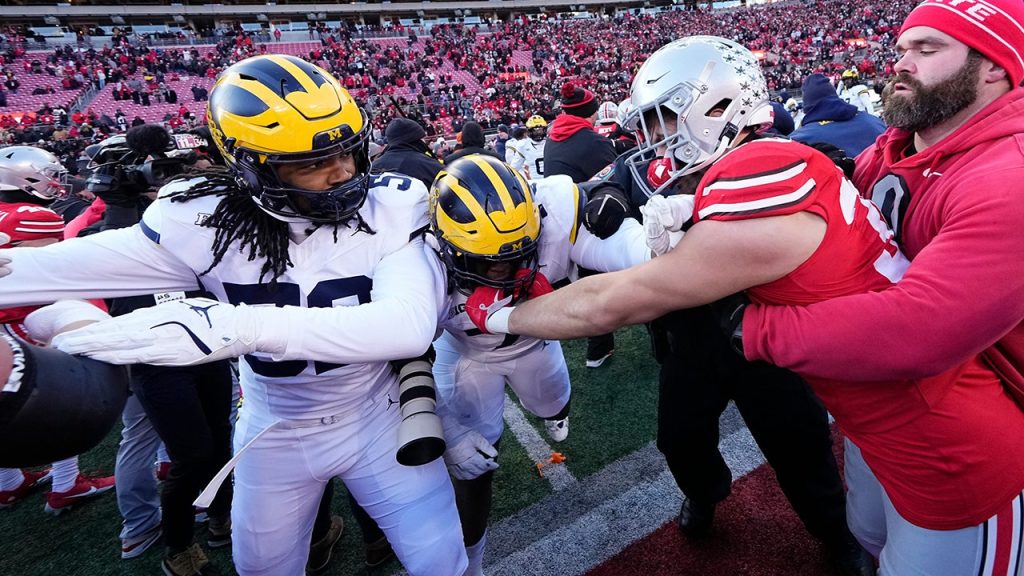The Big Ten Conference levied fines totaling $100,000 each against both the University of Michigan and Ohio State University following a significant postgame brawl that erupted after their football rivalry game on November 30, 2024. The confrontation began when Michigan players attempted to plant their flag at the center of Ohio State’s field, an act that was met with disdain from the Buckeyes. The situation escalated into a physical altercation involving players from both teams, prompting law enforcement to intervene with pepper spray to disperse the gathering crowd. The Big Ten’s decision to impose fines on both institutions stemmed from their actions not only violating the conference’s Sportsmanship Policy but also endangering the safety of those present, including players and bystanders.
The incident gained attention when footage captured a Michigan player successfully embedding their flag into the Ohio State logo, which acted as a catalyst for the ensuing chaos. While the identity of the player who planted the flag remains unclear, several Ohio State athletes reacted swiftly, rushing the field to confront the Michigan players. Ohio State defensive end Jack Sawyer ultimately intercepted the flag, discarding it on the ground in an act of defiance. This moment exemplified the underlying tensions that often accompany one of college football’s most intense rivalries, highlighting the emotional stakes involved in such matchups.
In the aftermath of the altercation, the Ohio State University Police Department confirmed that a coalition of law enforcement agencies was engaged in dispersing the melee. As part of their efforts, multiple officers utilized pepper spray, and the department is leading an ongoing investigation into the conflict. Such violent outbursts raise critical concerns about player conduct and the broader implications for college athletics, particularly regarding rivalries known for their passionate fanbases and intense atmospheres. The Big Ten Conference has stated that their involvement in the matter will conclude with the fines, although the potential repercussions for the players involved remain uncertain.
Commenting on the incident, Michigan running back Kalel Mullings expressed regret over the brawl, indicating that it overshadowed what had been an exciting contest. In a postgame interview, he condemned the behavior, suggesting it was detrimental to the sport and underscoring the need for athletes to exhibit better sportsmanship, regardless of the competitor’s actions. His sentiments reflected a growing consensus among commentators and fans who believe that while rivalries are integral to college football, they should not descend into misconduct or violence. Mullings emphasized that all disputes should have been settled during the game and that postgame confrontations were unnecessary.
The game itself, which ended with Michigan defeating Ohio State 13-10, was characterized by intense competition between the two schools. Celebrated as one of college football’s iconic matchups, tensions often run high, making such incidents, though unfortunate, not entirely unexpected. While athletes are encouraged to give their all in pursuit of victory, the line between competitive spirit and unsportsmanlike behavior is a fine one that seems to have been crossed in this instance. As colleges assess how to handle the aftermath of such disruptions, there remains an emphasis on fostering respect and healthy competition between rival teams.
In conclusion, the events of November 30, 2024, serve as a reminder of the complexities inherent in college sports where passion often meets the pressures of competition. Both Michigan and Ohio State now face scrutiny not only for their on-field actions but for the image they project as institutions. The fines from the Big Ten Conference encapsulate the need for accountability in collegiate athletics, where the focus should ideally remain on the sport and its values of respect, integrity, and sportsmanship. Moving forward, it is essential that both institutions, alongside the players and fans, engage in self-reflection to prevent similar occurrences and preserve the spirit of college football rivalries.

